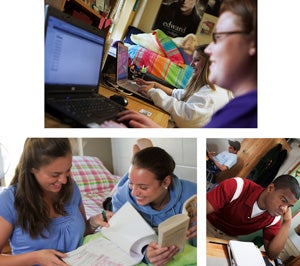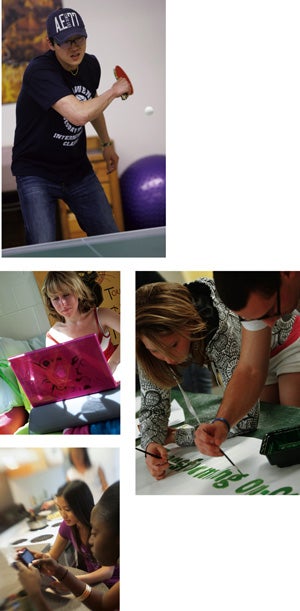A New World of Community Living and Learning
On the day in September when freshmen were moving into their residence halls, Nancy Fey-Yensan, interim dean of the College of the Environment and Life Sciences, stood outside Browning Hall to welcome them and their parents.
She and 14 members of the CELS faculty helped unload cars, directed students to their rooms, and reassured parents that even the dean had a personal interest in their kids. It was the first instance of what has become regular contact between the college faculty and freshmen who are residents in what is known as a Living and Learning Community (LLC).
“I was invigorated by the experience. One girl came up to me afterwards and said she was surprised that she could actually ask the dean a question in person. Contact with the faculty is so important. It’s like we’re visiting their homes.”
—Nancy Fey-Yensan, interim dean of the College of the Environment and Life Sciences
This is not your father’s dorm (as they were once known), or your mother’s. It’s probably not a freshman’s older sibling’s residence hall either. It’s a new world of community living and learning, an effort to smooth the way academically and socially for students who have often been intimidated by the sheer size of their new environment.
“The demand is greater than we can meet currently,” says Jayne Richmond, dean of University College and a leader in the effort to establish LLCs six years ago. “All the research shows that this has a positive impact on social adjustment and academic success.”
CELS was the first to adopt an LLC approach, but it was followed soon after by the Colleges of Human Science and Services, Nursing, and Engineering. Within each college there are dozens of major disciplines, and freshmen are exposed to all of them through the LLC. The University has even established an LLC for students who are undecided about a major so they can learn about majors in every college.
 It’s all about enhancing academic success. Having students living together according to their major gives them a common thread to interact, and the living arrangement makes it easier for them to study together.
It’s all about enhancing academic success. Having students living together according to their major gives them a common thread to interact, and the living arrangement makes it easier for them to study together.
“I think each college in the University could have this within the next couple of years,” says Lester “Chip” Yensan, Nancy’s husband and the assistant vice president for student affairs, who is also director of Housing and Residential Life.
The impetus for the program came from the convergence of newly renovated residence halls with the formation of Learning Community course clusters for freshmen in 2000. The Learning Communities had a positive academic and social effect, so the idea of extending that into residence hall life seemed logical, especially since the University had already done that with special housing units for the International Engineering Program and for other students with special interests such as social justice issues.
As Yensan and Richmond both note, the concept partners the University’s academic community and its residential life staff. Housing and Residential Life funds a liaison, Deborah Bergner, who directs educational programs, and HRL also provides free housing for several upper class students who serve as mentors in the various LLC residence halls.
“It’s one more element of community on a large campus,” Yensan says. “College can seem overwhelming when you are surrounded by so many people. This living structure makes the social adjustment much easier because students are meeting others with similar interests, and they are often living with students who are taking the same classes.”

Richmond points out that the communities couldn’t have happened “without a commitment from the colleges,” which meant faculty had to buy into it.
Dean Raymond Wright of the College of Engineering was also outside Tucker and Merrow halls on move-in day, as were several engineering faculty. Wright, Fey-Yensan, and other deans held “Meet the Dean” nights in their respective LLC residence halls during first semester, and faculty from various departments within the colleges have visited the dorms for special programs, academic advising, and casual conversation.
“I was invigorated by the experience,” Fey-Yensan says of her early meetings with freshmen at Browning. “One girl came up to me afterwards and said she was surprised that she could actually ask the dean a question in person. Contact with the faculty is so important. It’s like we’re visiting their homes.”
Annemarie Vaccaro, assistant professor of human development and family studies, one of the majors offered in the College of Human Science and Services, coordinated LLCs at the University of Denver for several years before coming to URI. As her college’s liaison with its LLC, she has arranged a number of programs addressing both academic and social concerns for students, but she said that getting to know a faculty member as “someone who has a life outside the classroom” can be an important part of the equation. For example, Disa Hatfield, assistant professor of kinesiology, made a presentation last October on power weightlifting for HSS students at Butterfield.
Resident Academic Mentor
Other colleges have arranged activities from pizza parties to career information meetings, and while faculty involvement is significant, much of the program is driven by students themselves. Each LLC residence hall has an upper class resident academic mentor (RAM) who organizes activities, provides plenty of information about majors, and offers tutoring and advice to the freshmen. The RAMs receive free housing as part of their job and put in five hours of office time each week in addition to their other duties.
“It’s all about enhancing academic success,” says Deborah Bergner, coordinator of educational programs in the office of Housing and Residential Life. “We identify high risk courses and provide tutoring. The RAMs encourage students to form study groups for their common classes.”
That has been one of the immediate results of clustering students according to major college. Many of them take classes together, and the living arrangement makes it easier for them to study together. “Having students living together who are taking the same classes gives them a common thread to interact,” says Kristina Shvets, a fourth year pharmacy major and a RAM for undeclared freshmen. “They’re all in the same boat.”
Jennifer Sixsmith, a senior nursing major who is the RAM at Peck Hall, says, “It really manages freshmen anxiety over difficult classes. They know others are there to help and many are in the same situation. It also gives them a quick, easy way to meet others in their major.”
For Matt Hooks, a sophomore in computer engineering in the International Engineering Program, his LLC experience last year led him to form close enough friendships with several dorm mates that the 10 of them arranged to live in a suite in Eddy Hall this year. “I was a little apprehensive about doing it because I was thinking I didn’t want to live only with engineers, but I decided to try it,” Hooks said. “I realized that we had similar interests and all got along. The first night in the dorm we talked until 2 a.m.”
As Chip Yensan notes, administering and organizing LLCs is an ongoing process. He says HRL is gathering more and more information about students’ lifestyles in efforts to match roommates. Staff have remained flexible enough to honor roommate requests for freshmen who want to room with a friend who isn’t majoring in their discipline. As staff discover glitches in the system, they make such adjustments as including nursing majors in a residence hall with engineering majors for a better male/female mix.
“This has made a more complicated operating situation for us, but it’s worth the effort in the success of the students,” Yensan says.
Another engineering major, Kyle Rafferty, recalls his freshmen year experience as positive, adding that he didn’t feel that he was meeting only students in his field. “Most of my friends are engineers, but I have met other students through clubs and activities,” said Rafferty, now a junior and the RAM for engineering. “The activities that we organize for the freshmen—like a tinfoil boat design contest that we did in September—really facilitates people getting to know one another.”
Dean Wright says it makes a big difference for freshmen to interact with upper class majors like Rafferty because they’ve taken courses in physics and chemistry that the freshmen are struggling with: “Our goal is to get them excited about engineering even if they don’t know specifically what they want to do. We’re introducing them to all the different areas of engineering that they could pursue. This adds a layer of mentoring and contact with the college. We can help them through tough courses by supporting them with tutoring, and we’re showing all the different career paths they have in front of them.”
Ultimately, says Kristina Shvets, “We help the freshmen realize that school is their job. They learn to learn together.”
Richmond points out that research done on similar programs elsewhere shows positive results from improved campus safety bred by closer familiarity among students to greater academic success. The research has also indicated lower levels of binge drinking and higher levels of positive social adjustment among freshmen. “We don’t know yet what the impact will be on student retention, but everything is telling us that this will definitely help,” she said.
By John Pantalone ’71
 Home
Home Browse
Browse Close
Close Events
Events Maps
Maps Email
Email Brightspace
Brightspace eCampus
eCampus


